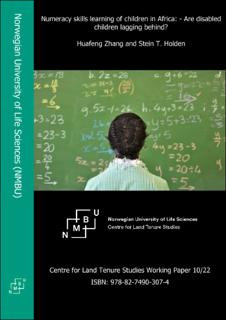| dc.contributor.author | Zhang, Huafeng | |
| dc.contributor.author | Holden, Stein T. | |
| dc.coverage.spatial | Africa | en_US |
| dc.date.accessioned | 2022-11-10T11:33:28Z | |
| dc.date.available | 2022-11-10T11:33:28Z | |
| dc.date.issued | 2022-11 | |
| dc.identifier.isbn | 978-82-7490-307-4 | |
| dc.identifier.uri | https://hdl.handle.net/11250/3031138 | |
| dc.description.abstract | Significant progress has been achieved in universal basic education in African countries since the late 1990s. This study provides empirical evidence on the within- and across-country variation in numeracy skills performance among children based on nationally representative data from eight African countries (DR Congo, The Gambia, Ghana, Lesotho, Sierra Leone, Togo, Tunisia, and Zimbabwe). We assess whether and to what extent children with disabilities lag in numeracy skills and how much it depends on their type of disabilities. More specifically, we explore whether disabled children benefit equally from better school system quality.
The assessment is analysed as a natural experiment using the performance of non-disabled children as a benchmark and considering the different types of disabilities as random treatments. We first evaluate the variation in average numeracy skills in the eight African countries. They can roughly be divided into low- and high-numeracy countries. We apply Instrumental Variable (IV) methods to control the endogeneity of completed school years when assessing subjects’ school performance and heterogeneous disability effects. Children with vision and hearing disabilities are not especially challenged in numeracy skills performance. The low numeracy skills among physically and intellectually disabled children are mainly attributable to their limited school attendance. Children with multiple disabilities are constrained both by low school attendance and by poor numeracy skills return to schooling. The average differences in school performance across the high- versus low-numeracy skill country groups are larger than the within-group average differences for disabled versus non-disabled kids. This indicates that school enrolment and quality are crucial for children’s learning of numeracy skills, and that disabled children benefit equally from better school quality across these African countries. | en_US |
| dc.language.iso | eng | en_US |
| dc.publisher | Norwegian University of Life Sciences, Ås | en_US |
| dc.relation.ispartofseries | CLTS Working paper;10/22 | |
| dc.rights | Attribution-NonCommercial-NoDerivatives 4.0 Internasjonal | * |
| dc.rights.uri | http://creativecommons.org/licenses/by-nc-nd/4.0/deed.no | * |
| dc.subject | Numeracy skills learning | en_US |
| dc.subject | Across-country comparison | en_US |
| dc.subject | Children with disabilities | en_US |
| dc.subject | Disability types | en_US |
| dc.subject | Disability effects | en_US |
| dc.subject | School enrolment | en_US |
| dc.subject | Sustainable Development Goals | en_US |
| dc.subject | Africa | en_US |
| dc.title | Numeracy skills learning of children in Africa: - Are disabled children lagging behind? | en_US |
| dc.type | Working paper | en_US |
| dc.source.pagenumber | 39 | en_US |

